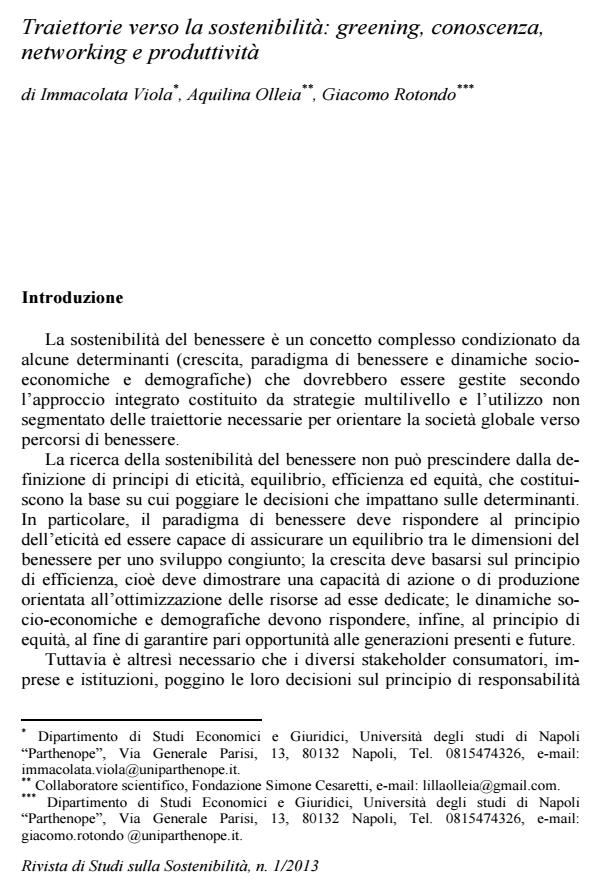The trajectories towards the sustainability of well-being: greening, knowledge, networking and productivity.
Journal title RIVISTA DI STUDI SULLA SOSTENIBILITA'
Author/s Immacolata Viola, Aquilina Olleia, Giacomo Rotondo
Publishing Year 2013 Issue 2013/1
Language Italian Pages 12 P. 129-140 File size 203 KB
DOI 10.3280/RISS2013-001010
DOI is like a bar code for intellectual property: to have more infomation
click here
Below, you can see the article first page
If you want to buy this article in PDF format, you can do it, following the instructions to buy download credits

FrancoAngeli is member of Publishers International Linking Association, Inc (PILA), a not-for-profit association which run the CrossRef service enabling links to and from online scholarly content.
Putting the sustainability of well-being at the center of a new social project requires the behavioral patterns of individual, business strategies, and policies, put in place at different levels (global, regional and disadvantaged groups) to take, as an element guide, principle of responsibility to the replicability of the capital stock. Stakeholder task is to seek the maximum compatibility in the adoption of the “trajectories” that are able to orient the global society towards the sustainability of well-being. It is our opinion that, in this context, four trajectories have a strategic value: greening, knowledge, networking and productivity.
Keywords: Greening, productivity, knowledge, networking, sustainability of wellbeing, social share responsibility
- Cesaretti G.P., Scarpato D., Misso R., Annunziata A., Borrelli I.P., Viola I., Olleia A. (2011). Sustainability and equity in a competitive economy: The “green society” strategy. Quality - Access to Success, 12(125): 22-28.
- Coleman R. (1990). Foundation of social Theory. Cambridge: Cambridge University Press.
- Marchica J. (2004). The Accountable Organization Reclaiming Integrity, Restoring Trust. Palo Alto: Davies-Black Publishing
- Proost J., Brunori G., Fischler M., Rossi A. e Šumane S. (2009). Knowledge and social capital. In: Knickel K., Tisenkopfs T. e Peter S. (a cura di). Innovation processes in agriculture and rural development. Results of a cross-national analysis of the situation in seven countries, research gaps and recommendations. Final report of IN-SIGHT Project – 6FP, pp. 68-92.
- Renting H. e Wiskerke H. (2010). New Emerging Roles for Public Institutions and Civil Society in the Promotion of Sustainable Local Agro-Food Systems. Proceedings of the 9th European Farming Systems Association Symposium, Vienna, Austria: 1902-1912.
- Jackson T., Victor P. (2011). Productivity and work in the green economy. Some theoretical reflections and empirical tests. Environmental Innovation and Societal Transitions, 1: 101-108, DOI: 10.1016/j.eist.2011.04.005
- Keynes J. M. (2009). Possibilità economiche per i nostri nipoti. Milano: Adelphi.
- Krugman P. (1994). Competitiveness: a dangerous obsession. Foreign affairs, 28-44, DOI: 10.2307/20045917
- Stiglitz J. E., Gallegati M. (2013). Se l’1% detta legge. Almanacco di economia. Il ritorno dell’uguaglianza. MicroMega.
- Visco I. (2009). Investire in conoscenza. Per la crescita economica. Bologna: il Mulino.
- The Made in Italy "Beyond the Growth": The Food System Green Oriented Immacolata Viola, in RIVISTA DI STUDI SULLA SOSTENIBILITA' 2/2014 pp.125
DOI: 10.3280/RISS2014-002008
Immacolata Viola, Aquilina Olleia, Giacomo Rotondo, Traiettorie verso la sostenibilità: greening, conoscenza, networking e produttività in "RIVISTA DI STUDI SULLA SOSTENIBILITA'" 1/2013, pp 129-140, DOI: 10.3280/RISS2013-001010